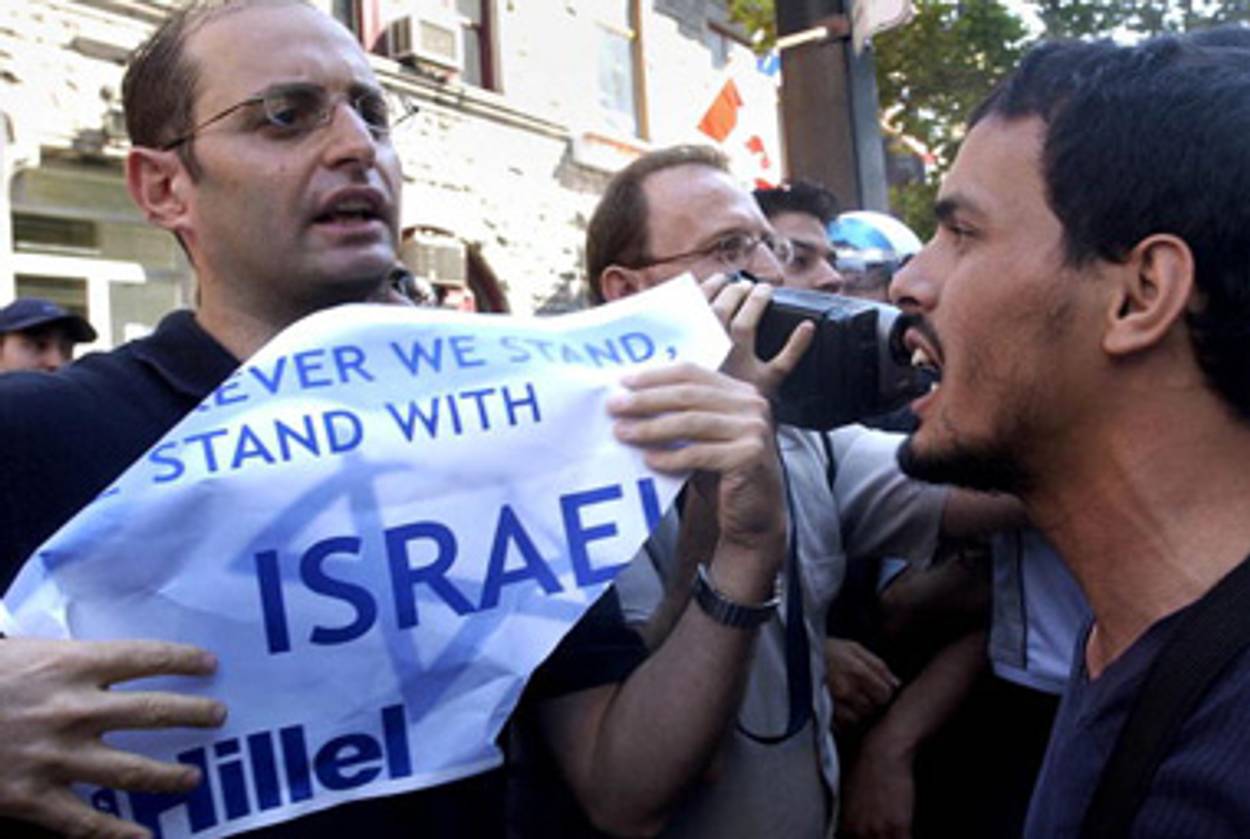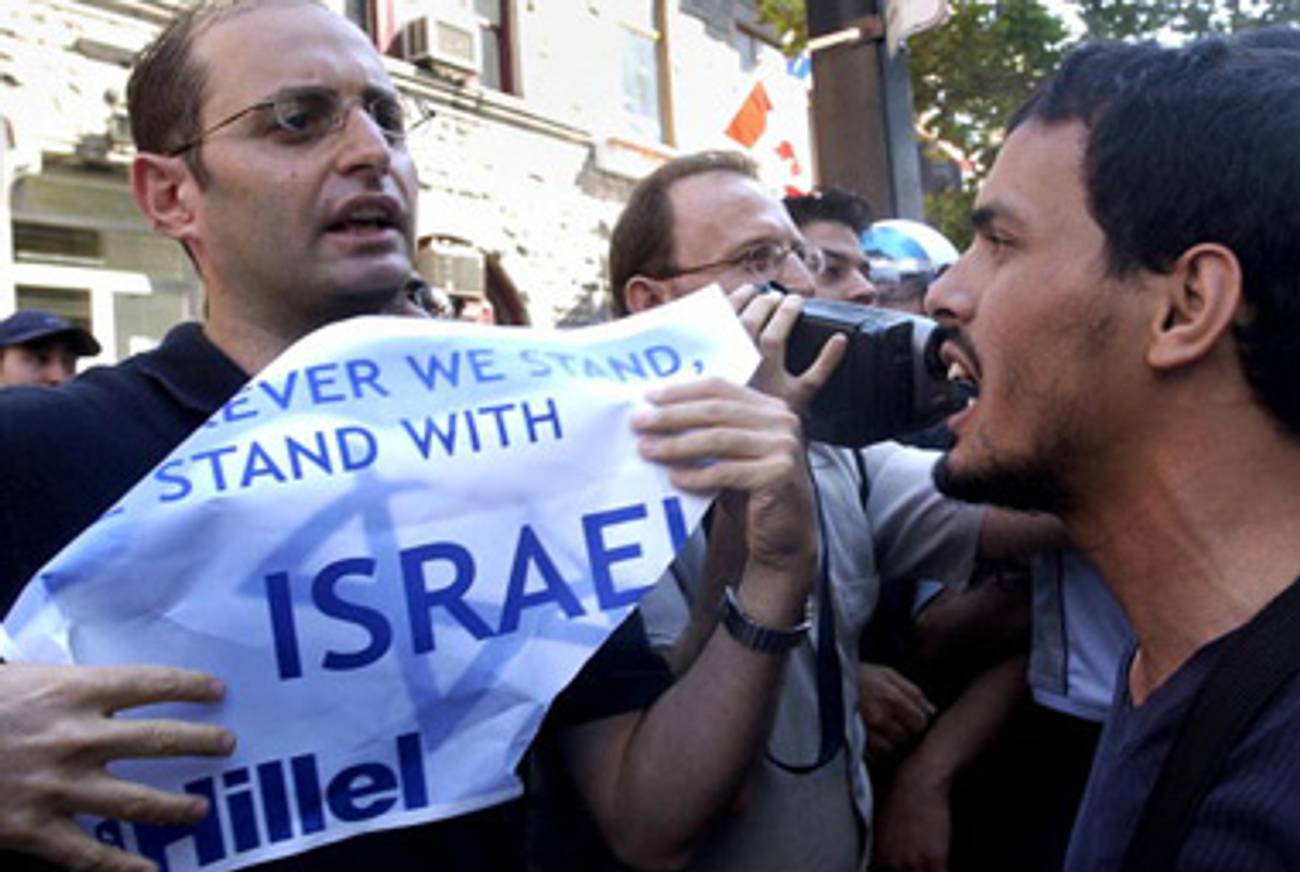Oh, Canada
Why anti-Zionism festers in a country otherwise known for its friendliness




Although the two-week period in March designated as Israeli Apartheid Week sputtered this year, attracting few participants, it highlighted a great Canadian anomaly. Twelve of the 40 communities the IAW website identified as host cities were in Canada. IAW was hatched in Toronto. Some of the worst anti-Israel violence in North America has occurred in the land of endless winters and polite pacifists. Last year, at York University in Toronto, hooligans chanting, “Die, Jew, get the hell off campus” menaced Jewish students, who barricaded themselves in the Hillel offices, terrified. This year, at the University of Western Ontario, three students who started a Facebook group called “UWO Students Against Israeli Apartheid Week” reported receiving death threats. Why are such virulent anti-Zionism and anti-Semitism festering in Canada despite its national niceness?
The violence contradicts the Canadian government’s dramatically pro-Israel turn in the last several years. Compared to America’s “love-fest,” Canada has always been more “reservedly respectful” of “both Israel and Jews,” says Ted Sokolsky, president of the UJA Federation of Greater Toronto. Former Prime Minister Jean Chrétien’s Liberal government from 1993 to 2003 treated Israel coldly. But since 2006, Prime Minister Stephen Harper’s Conservative government has been enthusiastically pro-Israel. Last spring, Canada led in boycotting the Durban Review Conference in Geneva, fearing a rehash of the 2001 anti-Zionist hate-fest.
Thanks especially to Irwin Cotler, a Liberal MP and former justice minister, support for Israel is what Canadians call “all party.” This year, the Liberal leader and human-rights activist Michael Ignatieff repudiated the false analogy that has become a central anti-Zionist tenet: that of equating the Israeli-Palestinian national conflict with the systematic racism of South Africa’s Afrikaner regime. “International law defines ‘apartheid’ as a crime against humanity,” Ignatieff has said. “Labeling Israel as an ‘apartheid’ state is a deliberate attempt to undermine the legitimacy of the Jewish state itself. Criticism of Israel is legitimate. Attempting to describe its very existence as a crime against humanity is not.”
Nevertheless, despite all this goodwill off-campus, and even considering Canadians’ cultural aversion to conflict, many Jewish college students in Canada report feeling “uncomfortable, unsafe, and targeted” on campuses, says Zach Newburgh, the Hillel Montreal president. Newburgh transferred from the University of Toronto to McGill partially because of Toronto’s aggressive anti-Israel environment, which peaks during anti-Israel week. Many Jewish students felt besieged, “no matter what stripe they were,” Newburgh recalls, “whether they were Orthodox, Reform, Conservative, or just Jewish, had been to Jewish summer camp or not, had been to Israel or not—it did not matter.” Newburgh received death threats, he says, because he criticized the IAW’s activities in online forums.
One of the most violent anti-Israel incidents ever in North America remains the September 9, 2002, riot at Concordia University in Montreal. Protesters blocked Benjamin Netanyahu, then on the global lecture circuit, from speaking, smashed windows, threw pennies at Jewish students to mock them as cheap, and shut down the school’s downtown campus. For years, Concordia was the center of Canadian anti-Zionism, a dubious mantle York University now wears.
Canadian anti-Zionism, like much student activism, benefits from the minority megaphone effect, in which small but shrill groups can command attention, especially on today’s quiescent campuses. Reut, the centrist Tel Aviv-based think tank, recently identified the anti-Zionists’ “hub” strategy: concentrating activist firepower in calm, carefully selected areas to allow a few marginal but persistent protesters to masquerade as members of a mass movement. Today’s campuses serve as excellent hubs.
Much anti-Israel activity on campus reflects a strategy with Soviet and Nazi roots, hatched in Durban, South Africa, days before the Sept. 11 terrorist attacks. Both the U.N.’s World Conference Against Racism and the parallel, non-governmental organization meetings singled out one form of nationalism as racist—Jewish nationalism, meaning Zionism. The NGO Forum produced a declaration announcing “a policy of complete and total isolation of Israel as an Apartheid state.” This “Durban Strategy” targeted Israel as illegitimate because of its alleged racism, fueling the BDS movement, which seeks to isolate Israel through Boycotts, Divestments, and Sanctions.
“BDSers” selected London as a European hub and then targeted Toronto, making York University and University of Toronto anti-Israel hotspots. Off-campus, agitators advocated boycotting Israeli wine, a museum exhibition showcasing the Dead Sea Scrolls, and the Toronto Film Festival’s celebration of Tel Aviv’s centennial. Those efforts backfired.
Delegitimizers have targeted Toronto, like London, because a core group of activists already exists, and the anti-Zionists believe their campaign might flourish there. Many of the most strident anti-Zionists are Muslims. Canada’s Muslim population grew more than tenfold from 1981 to 1991 then doubled to nearly 600,000 by 2001, with a strong concentration in Toronto. “University of Toronto, where I spent my first year, had a far more oppressive anti-Israel atmosphere than McGill,” says Mookie Kideckel, the president of Hillel McGill, who in February mobilized hundreds of McGill students to defeat a resolution advocating boycotting Israel. Many observers believe that there are more Muslims at the University of Toronto than at McGill, and that the Muslims at the Toronto campus are more active.
The Canadian multicultural “salad bowl” facilitates ethnic bonding, for better and worse. Jews, Italians, Greeks, and Muslims often find it easier to maintain their traditions and distinct identities in Canada, without the pressures of America’s “melting pot.” In Canada, according to the UJA’s Sokolsky, ethnic divisions are more pronounced. “As a result,” he says, “these ethnic groups tend to be much more siloed” than in the United States. “Behavior we would think of as improper and undemocratic is much more readily accepted socially.”
The virulent anti-Zionism often leeching into anti-Semitism embedded in some Canadian Muslims’ identities receives more in-group encouragement and even government support here. Harper’s government has cut funding to the Canadian Arab Federation and the Canadian Islamic Congress for supporting Hamas and Hezbollah and demonizing Israel, which has triggered accusations of governmental racism.
As in the rest of the West, Canadian anti-Zionism feeds off an unlikely alliance between Islamist fundamentalists and cosmopolitan leftists. Canadian political culture is more European and New Left than American political culture. David Luchins, an American political science professor at Touro College who worked for the late Senator Daniel Patrick Moynihan for two decades, calls Canada a “goo-goo nation,” using the traditional American term for progressive good-government advocates. In this case it means trying to be an upstanding member of the community of nations, which is admirable, but also a devotee of the United Nations, which risks being delusional.
Many Canadian elites still worship at the altar of the international human rights regime McGill Professor John Humphrey helped construct after World War II. An elaborate organizational infrastructure also intensifies and funds Canadian anti-Zionism as an expression of general solidarity with the left, including the CBC public broadcasting system, leading labor unions, some government-mandated student organizations, and certain Quebec nationalist organizations. Jean Ouellette, a retired professor at the Université de Montréal, notes that, like most Canadians, Quebecois see the conflict “in purely territorial terms and not as an existential divide between Jews and Arabs and between Islamism and the West.” Thus, if campuses are among the most Europeanized—and most anti-Israel—spaces in the United States, Canada is the most Europeanized and most anti-Israel space in North America.
Facing this aggressive offshoot of multicultural leftism dominating Canadian universities is an Anglicized administrative culture more primed to appease radicals than to ensure that embattled Jewish students feel safe in their campus homes. The leading Canadian universities are public; most leading American universities are private. Private institutions enjoy more latitude to curtail rambunctious student groups and are more donor-sensitive. At pricier private schools, it is rare for individuals to “take one class and stay as professional activists,” which was a “big problem at Concordia,” notes Dan Hadad, the marketing and communications director for the Canadian Council for Israel and Jewish Advocacy.
This year’s under-attended Israeli Apartheid Week activities revealed that despite all their advantages, the pro-Palestinian forces trying to delegitimize Israel with the apartheid slur have failed to mount a mass movement. Most students on the targeted campuses north and south of the border ignored the activities. The Middle East remains a marginal matter for most Canadians and Americans.
Pro-Israel forces have also pushed back. “Buycotts” have trumped “boycotts,” most notably in Toronto, where Israeli wine, the Dead Sea museum exhibit, and the Israeli films all sold out when targeted. This year, editorials and politicians in Canada denounced IAW vehemently while in the United States IAW was mostly ignored. On February 25, the Legislative Assembly of Ontario unanimously passed, by voice vote, a resolution condemning Israel Apartheid Week “as it serves to incite hatred against Israel, a democratic state that respects the rule of law and human rights, and the use of the word apartheid in this context diminishes the suffering of those who were victims of a true apartheid regime in South Africa.”
University administrators are also starting to lead. Last year, Carlton University—invoking Canadian human rights and equity laws that are less protective of free speech than American laws—banned an IAW poster caricaturing a menacing Israeli Army helicopter shooting at a Gaza child clutching his teddy bear. Others are objecting on the grounds, as a National Post editorial put it, that trying “to vilify a single country [is] an inherently bigoted exercise. Unlike, say, ‘anti-racism week’ or ‘diversity awareness week,’ IAW does not champion a concept—rather, it targets a particular group of people defined by religion and citizenship.”
What most compels administrators is the Concordia calculus. The anti-Netanyahu riot so damaged Concordia University’s reputation that engineering and business students united to unseat the radical, pro-Palestinian student leadership fomenting much of the trouble. Since last year, York University has also recognized the need to undertake massive reputational damage control.
Most Canadian Jewish activists interviewed noted these triumphs, as well as the flashpoints in the United States, especially at Berkeley and another University of California campus, Irvine. The IAW forces seem increasingly marginalized, administrators are responding, and individual students refuse to be cowed. Zach Newburgh not only transferred successfully to McGill University and became the president of Montreal Hillel, but he is also the incoming president of the McGill student society. These subtle but significant successes are often drowned out by louder, shriller protests. The challenge in Canada, as elsewhere, remains to fight the toxic anti-Israel atmosphere that poisons so much discourse about the Middle East without exaggerating the strengths of this megaphone minority.
Gil Troy, a professor of history at McGill University in Montreal and a fellow at the Shalom Hartman Institute in Jerusalem, is the author of six books on American history and Why I Am A Zionist: Israel, Jewish Identity and the Challenges of Today.
Gil Troy, a Distinguished Scholar in North American Studies at McGill University, is the author of The Age of Clinton: America in the 1990s, published by St. Martin’s Press. His next book will update Arthur Hertzberg’s The Zionist Idea. Follow on Twitter @GilTroy.
Professor Gil Troy, a Senior Fellow in Zionist Thought at the JPPI, the global think tank of the Jewish people, is an American presidential historian, and, most recently, the editor of the three-volume set Theodor Herzl: Zionist Writings, the inaugural publication of The Library of the Jewish People.